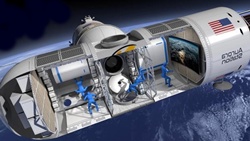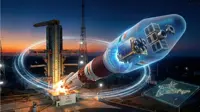If even the most exclusive hotels on earth are too mundane and humdrum for you, there’s an option coming – in outer space. For a couple million dollars, you might be able to check that off your bucket list in the next four years.

Orion Span, a Houston-based space tech startup, has announced plans to launch the first-ever luxury space hotel into earth's orbit by 2021. The company says the so-called Aurora Station will be ready to accommodate visitors the following year.
The first-ever luxury space hotel was introduced today during the Space 2.0 Summit in San Jose, California last week. Named after the light phenomenon that illuminates the earth's polar skies, Aurora Station is being developed by Orion Span and the company's team of space industry veterans, who according to a company release have over 140 years of human space experience.
The price of a ticket for a 12-day stay will be $9.5 million per person, which comes to $791,666 per night.
Orion Span has yet to contract with a launch provider to put future visitors - and for that matter the station itself - into orbit. In the past, private citizens have been sent to the International Space Station on $20 million to $40 million round-trip tickets, but according to Frank Bunger, the company's founder and chief executive, Orion Span's trips are less expensive because of declining launch prices. Prospective clients can put down an $80,000 refundable deposit right now for future stays.
The exclusive hotel will host six people at a time – including two crew members. Space travellers will enjoy a completely authentic, once-in-a-lifetime astronaut experience with extraordinary adventure during their 12-day journey, the company says.
"Upon launch, Aurora Station goes into service immediately, bringing travellers into space quicker and at a lower price point than ever seen before," Bunger said in a statement. "Our goal is to make space accessible to all, by continuing to drive greater value at a lower cost."
The hotel, which is slated for launch into low Earth orbit (LEO) at around 200 miles from the earth's surface, will be about the size of the cabin of a large private jet. Company representatives say it will be roughly 43 ½ feet long by 14 feet wide, with a pressurized volume of 5,650 cubic feet. By comparison, the ISS is much larger, at 357 feet long, an internal pressurized volume of 32,33 cubic feet, and soars 250 miles above Earth.
"Orion Span has additionally taken what was historically a 24-month training regimen to prepare travellers to visit a space station and streamlined it to three months, at a fraction of the cost,” Bunger adds. “Our goal is to make space accessible to all, by continuing to drive greater value at lower cost."
Completed, Aurora Station will be fully modular and host six people at a time with private, two-person suites. Four of those people will be guests and two will be crewmembers who are most likely former astronauts, the company says.
With the help of engineers who have worked on the ISS, the hotel is currently in construction in Housten, while Orion Span develops software for it in the Bay Area.
Aboard the station, travellers will roam freely in zero gravity, while orbiting the planet every 90 minutes. They can take in the sights, which will include about 16 sunrises and sunsets every 24 hours, through the station's many windows and get a virtual reality experience on the ship's "holodeck". Guests will also get the chance to participate in research experiments like growing edible plants - which can be taken home as souvenirs - and livestream with people back home via high-speed wireless internet.
"We're not selling a hey-let's-go-to-the-beach equivalent in space," Bunger tells Bloomberg. "We're selling the experience of being an astronaut."
The Orion Span Astronaut Certification (OSAC) will include a condensed version of online and in-person training at the company's facility in Houston, with final certification aboard the Aurora Station.
Upon returning to earth, guests "will be treated to a hero's welcome home", the company says.
Orion Span will likely cater to private space tourists as well as government space agencies, Bunger says.
A serial entrepreneur and former software engineer, Bunger has worked on other startups in the past, in addition to the seven-person Orion Span team.
Orion Span isn't the first to look to the skies for entrepreneurial opportunity. Plans were recently announced for a four-room hotel addition to the ISS that would cost $40 million per person. The Texas-based Axiom Space has plans to take tourists to the ISS by next year and launch a commercial space station by 2024.
Virgin Galactic, which said it would start sub-orbital space flights in 2009, is planning to charge $250,000 for future extraterrestrial trips.
If Aurora Station is successful, the company wants to launch identical modules and build a private space station. Long-term, the vision is to sell space.
"We will later sell dedicated modules as the world's first condominiums in space," Bunger adds. "Future Aurora owners can live in, visit, or sublease their space condo."
 Orion Span, a Houston-based space tech startup, has announced plans to launch the first-ever luxury space hotel into earth's orbit by 2021. The company says the so-called Aurora Station will be ready to accommodate visitors the following year.
Orion Span, a Houston-based space tech startup, has announced plans to launch the first-ever luxury space hotel into earth's orbit by 2021. The company says the so-called Aurora Station will be ready to accommodate visitors the following year.





















